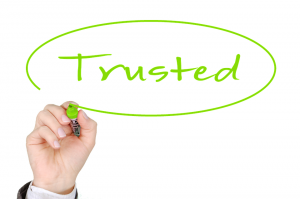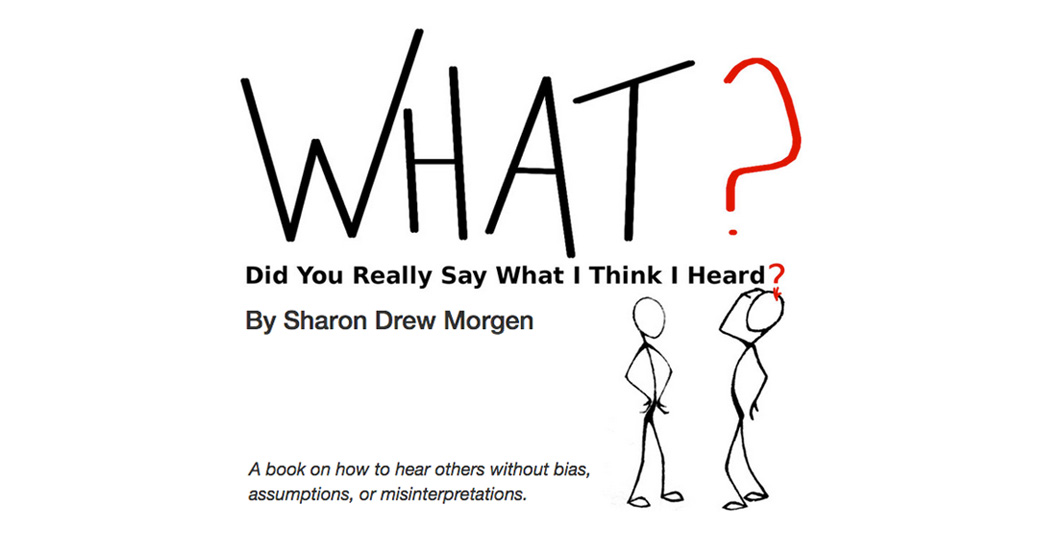Trust: what it is, and how to initiate it
 Trust. The big kahuna. The sales industry seeks it; doctors assume it; couples demand it; change can’t occur without it. But what is it? Why isn’t it easier to achieve? And how can we engender it in relationships?
Trust. The big kahuna. The sales industry seeks it; doctors assume it; couples demand it; change can’t occur without it. But what is it? Why isn’t it easier to achieve? And how can we engender it in relationships?
I define trust as the awareness of Another as being safe, similar, and sane enough to connect with, and occurs when they
- have core beliefs that align and seem harmonious with mine,
- feel heard, accepted, respected, and understood by me,
- feel compatible or safe as a result of our interacting,
- believe their status quo won’t be at risk when connected to me.
Unless these criteria are satisfied, trust can’t occur no matter how kind, professional, necessary, or well-intended another person or message is. It’s a Belief issue.
BELIEFS DEFINE US
Every one of us has Beliefs unique to us. Our Beliefs are the norms and rules we live by, developed over our lifetimes to make decisions and act against. We gravitate to, and trust, folks with similar foundational Beliefs and world views that match well-enough with our own to proclaim “safety”.
Largely unconscious, illogical to others and hard to change, our Beliefs regulate us, define who we are and enable us to show up congruently in the world. We even listen through ears biased by our Beliefs.
Beliefs instigate our habits and assumptions, restricting our life choices such as our occupations, politics, values, mates – even our child rearing practices. And our Beliefs are the initiators of our behaviors – behaviors being Beliefs in action, the expressions of our core systems.
Sadly, because everyone’s Belief systems are unconscious and idiosyncratic, and because we each view the world through our own Beliefs and perceptions, it’s difficult to accurately perceive Another’s internal world view. It’s here, in our Beliefs, where our world views collide.
For those folks whose jobs are to influence, there’s an immediate problem. The content they share, or even their unique delivery style, may unwittingly offend the Belief system of the Communication Partner (CP). Bad news for sellers, coaches, managers, etc. who attempt to promote change or buy-in by pushing their ideas and instead cause resistance and distrust.
DRIVERS FOR TRUST
I’d like to offer thoughts on some of the ways we fail when trying to engage trust, then provide some ideas of how to stimulate it.
Relationship Building: We’ve been led to believe that having a relationship encourages buy-in to new ideas. But it’s a conundrum: polite as an interaction appears or how necessary our message, we can’t easily build a relationship with folks with divergent Beliefs, or fight their automatic filters that react to us immediately. In other words, “pushing in” doesn’t work, even if our data and intent are accurate, and even if we think we have a relationship that entitles us to ‘share.’ We might have a superficial connection, but not a relationship; “making nice” does not constitute a relationship, or engender change or trust.
Information: As influencers we often attempt to “get in” with the information we assume our CPs need, without accounting for how it will be perceived. Sometimes the “right” data inadvertently tells our CP that they’re wrong (and we’re right). We fail to realize that our CPs only understand our intent to the degree it matches their Beliefs, or how their listening filters translate it for them. With the best will in the world, even with good data to help folks who need what we’ve got to share, we aren’t heeded.
In fact, information is the last thing needed to facilitate change or buy-in since people unconsciously defend their status quo. It’s our brain’s fault! Because all incoming data is translated for us automatically by our historic neural circuits, new ideas aren’t always interpreted accurately and run the risk of causing resistance. (See my book WHAT? on this topic.) So save the information sharing for when a clear path to mutual Beliefs and trust has been developed.
Think about it: if you’re an environmentalist, the “rational/ scientific” data you offer to “prove” climate change won’t persuade those who disagree; if you’re a proponent of the medical model, you won’t use alternate therapies to manage an illness no matter how strong the data for changing your nutrition.
Clear Communication: We all think we communicate clearly, yet we’re not as effective speaking in ‘Other’s language’ given our CPs unconscious, biased listening filters that end up preventing our “risky” data from being heard accurately. Certainly we believe we’re choosing the “right” words and approach to convey our intent. Yet our message is heard accurately only by those with similar Beliefs and resisted by the very people who need our information the most.
FACILITATE BELIEF CHANGE FIRST
Since our great ideas and eager strategies don’t engender trust in folks with different Beliefs, and without trust we can’t change minds, what should we do?
As coaches, sellers, and leaders, we must carefully initiate conversations based on them discovering their own answers, with a goal to match their Belief criteria before offering new ideas. In this way we can help our CPs open up new possibility that actually creates trust:
- Enter each conversation with the goal of assisting your CPs in discovering how their Beliefs instigated their behaviors. Entering with the goal to offer information, or get your question answered, or extract promises of action will automatically engender distrust and resistance.
- Ask the type of questions that facilitate and enable internal discovery; conventional questions merely pull data biased by the needs of the Asker. I designed Facilitative Questions (see below) that enable congruent change without bias by leading the CP through their unique route to discovery.
- There is a specific series of steps that change entails. I’ve spent decades coding the steps of change for decision making and new habit generation. These promote congruent change by leading Others down their own choice points. Learn the steps, and help your CP traverse the steps to match Beliefs and encourage acceptance prior to mentioning your idea.
- Trust that your CP has her own answers and that she’ll shift toward excellence as appropriate for her. It won’t show up exactly as you’d hoped; but there will be a new opening for collaboration without resistance.
- Understand that until or unless your CP can recognize his own incongruences, there is no way he’ll welcome comments from you that sound like you’re saying he’s wrong or insufficient.
In other words, create a Beliefs-based bond that will open the possibility of you offering information later, once they’ve discovered exactly where they need it and how to use it.
FACILITATING TRUST THROUGH QUESTIONS
I’ve developed a new form of question (Facilitative Questions) that teaches others to scan their own internal state. These questions are unbiased, systemic, formulated with specific wording, in a specific order, and based on systemic brain change, not information gathering. They also take our CPs into a Witness state, beyond their automatic responses, and from which they can have a neutral, unbiased look at their status quo to notice if it’s operating excellently, and consider change if there might be a more congruent path.
Take a look at a conventional question vs a Facilitative Question:
Conventional: Do you think it’s time for a haircut? or Why do you wear your hair that way?
Telling someone they need a haircut, or asking them if they noticed they need a haircut, or giving them an article on new types of hair styles – all based on your own need to convince your CP to change – will cause defensiveness and distrust.
Facilitative Question: How would you know if it were time to reconsider your hairstyle?
This leads your CP
- into a Witness state,
- beyond their resistance and reaction,
- outside of their normal unconscious reactions,
- to notice the exact criteria they need to consider change and
- to open the possibility for new choices that match their own Beliefs.
By using this type of question we offer a route for the CP to discover their own best answer that aligns with their Beliefs and engenders trust. No push, no need for a specific response. Serving another by helping them discover their own Excellence.
I designed these questions as part of my Buying Facilitation® model, a generic change facilitation model (often used in sales) that enables congruent change. Sounds a bit wonky, I know, and it’s certainly not conventional. But worth researching. I’ve trained large numbers of sales folks and coaches over the past 40 years against control groups and consistently have a 40% success rate. When we facilitate our CPs down their path to conscious choice, we
- help them discover their incongruencies,
- help them understand the areas at risk,
- help them develop their own route to managing risk (i.e. change) and where they can’t do it themselves,
- enable buy-in from the elements that will be effected.
Until your audience is able to accomplish this in their own way, using their own Beliefs, they will hear you through biased ears, maintain their barriers, and engender trust only with those who they feel aligned with – omitting a large audience of those who may need you.
Stop using your own biases to engender trust: facilitate your CPs in changing themselves. Then the choice of the best solution becomes a consequence of a system that is ready, willing, and able to adopt excellence. And they’ll trust you because you helped them help themselves.
____________
Sharon-Drew Morgen is a breakthrough innovator and original thinker, having developed new paradigms in sales (inventor Buying Facilitation®, listening/communication (What? Did you really say what I think I heard?), change management (The How of Change™), coaching, and leadership. She is the author of several books, including her new book HOW? Generating new neural circuits for learning, behavior change and decision making, the NYTimes Business Bestseller Selling with Integrity and Dirty Little Secrets: why buyers can’t buy and sellers can’t sell). Sharon-Drew coaches and consults with companies seeking out of the box remedies for congruent, servant-leader-based change in leadership, healthcare, and sales. Her award-winning blog carries original articles with new thinking, weekly. www.sharon-drew.com She can be reached at sharondrew@sharondrewmorgen.com.
Sharon Drew Morgen June 2nd, 2025
Posted In: Change Management, Listening



